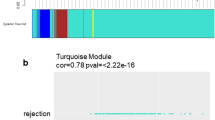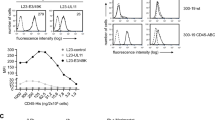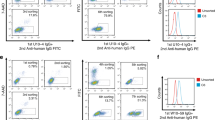Abstract
Recent advances using transgenic animals or exogenous complement inhibitors have demonstrated prevention of hyperacute rejection of vascularized organs, but not graft loss due to acute vascular rejection. Using various wild-type and cytokine-deficient mice strains, we have examined the mechanisms of acute vascular rejection. C57BL/6 mice deficient in interleukin12 or gamma interferon showed faster acute vascular rejection than did wild-type mice. Furthermore, mice defective in B-cell development showed no acute vascular rejection. These results demonstrate that the axis of interleukin 12 and gamma interferon provides a survival advantage in vascularized xenografts by delaying or preventing acute vascular rejection caused by a B cell-dependent mechanism.
This is a preview of subscription content, access via your institution
Access options
Subscribe to this journal
Receive 12 print issues and online access
$209.00 per year
only $17.42 per issue
Buy this article
- Purchase on Springer Link
- Instant access to full article PDF
Prices may be subject to local taxes which are calculated during checkout





Similar content being viewed by others
References
Auchincloss, H.J. & Sachs, D.H. Xenogeneic transplantation . Annu. Rev. Immunol. 16, 433– 470 (1998).
van den Bogaerde, J. & White, D.J. Xenogeneic transplantation . Br. Med. Bull. 53, 904– 920 (1997).
Leventhal, J.R., et al. The immunopathology of cardiac xenograft rejection in the guinea pig-to- rat model. Transplantation 56, 1–8 (1993).
Zaidi, A. et al. Life-supporting pig-to-primate renal xenotransplantation using genetically modified donors. Transplantation 65, 1584–1590 (1998).
Lin, S.S. et al. The role of antibodies in acute vascular rejection of pig-to-baboon cardiac transplants. J. Clin. Invest. 101, 1745–1756 (1998).
Xu, H. et al. Prolonged discordant xenograft survival and delayed xenograft rejection in a pig-to-baboon orthotopic cardiac xenograft model. J. Thorac. Cardiovasc. Surg. 115, 1342–1349 (1998).
Platt, J.L. et al. The role of natural antibodies in the activation of xenogenic endothelial cells. Transplantation 52, 1037 –1043 (1991).
Blakely, M.L. et al. Activation of intragraft endothelial and mononuclear cells during discordant xenograft rejection. Transplantation 58, 1059–1066 (1994).
Candinas, D. et al. T cell independence of macrophage and natural killer cell infiltration, cytokine production, and endothelial activation during delayed xenograft rejection. Transplantation 62, 1920–1927 (1996).
Matsumiya, G. et al. Analysis of rejection mechanism in the rat to mouse cardiac xenotransplantation. Role and characteristics of anti-endothelial cell antibodies . Transplantation 57, 1653– 1660 (1994).
Heinzel, F.P., Sadick, M.D., Holaday, B.J., Coffman, R.L. & Locksley, R.M. Reciprocal expression of interferon gamma or interleukin 4 during the resolution or progression of murine leishmaniasis. Evidence for expansion of distinct helper T cell subsets. J. Exp. Med. 169, 59–72 ( 1989).
Sayegh, M.H. et al. CD28-B7 blockade after alloantigenic challenge in vivo inhibits Th1 cytokines but spares Th2. J. Exp. Med. 181, 1869–1874 (1995).
Nickerson, P. et al. Manipulation of cytokine networks in transplantation: false hope or realistic opportunity for tolerance? Transplantation 63, 489–494 (1997).
Takeuchi, T., Lowry, R.P. & Konieczny, B. Heart allografts in murine systems. The differential activation of Th2- like effector cells in peripheral tolerance. Transplantation 53, 1281–1294 (1992).
Trinchieri, G. Interleukin-12: a proinflammatory cytokine with immunoregulatory functions that bridge innate resistance and antigen-specific adaptive immunity. Annu. Rev. Immunol. 13, 251–276 (1995).
Kitamura, D., Roes, J., Kuhn, R. & Rajewsky, K. A B cell-deficient mouse by targeted disruption of the membrane exon of the immunoglobulin mu chain gene. Nature 350, 423– 426 (1991).
Lauwerys, B.R., Renauld, J.C. & Houssiau, F.A. Inhibition of in vitro immunoglobulin production by IL-12 in murine chronic graft-vs.-host disease: synergism with IL-18. Eur. J. Immunol. 28, 2017–2024 (1998).
Morris, S.C. et al. Effects of IL-12 on in vivo cytokine gene expression and Ig isotype selection. J.Immunol. 152, 1047–1056 (1994).
Yoshimoto, T., Okamura, H., Tagawa, Y.I., Iwakura, Y. & Nakanishi, K. Interleukin 18 together with interleukin 12 inhibits IgE production by induction of interferon-gamma production from activated B cells. Proc. Natl. Acad. Sci. USA 94, 3948–3953 (1997).
Abed, N.S., Chace, J.H., Fleming, A.L. & Cowdery, J.S. Interferon-gamma regulation of B lymphocyte differentiation: activation of B cells is a prerequisite for IFN-gamma-mediated inhibition of B cell differentiation . Cell Immunol. 153, 356– 366 (1994).
Wang, H., et al. Complement inhibition with an anti-C5 monoclonal antibody prevents hyperacute rejection in a xenograft heart transplantation model. Transplantation 68, 1643–1651 (1999).
Zhang, Z. et al. Pattern of liver, kidney, heart, and intestine allograft rejection in different mouse strain combinations. Transplantation 62, 1267–1272 (1996).
Piccotti, J.R. et al. IL-12 antagonism induces T helper 2 responses, yet exacerbates cardiac allograft rejection. Evidence against a dominant protective role for T helper 2 cytokines in alloimmunity. J. Immunol. 157 , 1951–1957 (1996).
Piccotti, J.R. et al. Alloantigen-reactive Th1 development in IL-12-deficient mice . J. Immunol. 160, 1132– 1138 (1998).
Murphy, B., Auchincloss, H.J., Carpenter, C.B. & Sayegh, M.H. T cell recognition of xeno-MHC peptides during concordant xenograft rejection . Transplantation 61, 1133– 1137 (1996).
Konieczny, B.T. et al. IFN-γ is critical for long-term allograft survival induced by blocking the CD28 and CD40 ligand T cell costimulation pathways. J. Immunol. 160, 2059–2064 (1998).
Markees, T.G. et al. Long-term survival of skin allografts induced by donor splenocytes and anti-CD154 antibody in thymectomized mice requires CD4(+) T cells, interferon-γ, and CTLA4. J. Clin. Invest. 101, 2446– 2455 (1998).
Sypek, J.P. et al. Resolution of cutaneous leishmaniasis: interleukin 12 initiates a protective T helper type 1 immune response. J. Exp. Med. 177, 1797–1802 (1993).
Yoshida, A., Koide, Y., Uchijima, M. & Yoshida, T.O. IFN-gamma induces IL-12 mRNA expression by a murine macrophage cell line, J774. Biochem. Biophys. Res. Commun. 198, 857– 861 (1994).
Waterworth, P.D. et al. Pig-to-primate cardiac xenotransplantation and cyclophosphamide therapy. Transplant. Proc. 29, 899– 900 (1997).
Bhatti, F.N. et al. Three-month survival of HDAFF transgenic pig hearts transplanted into primates. Transplant. Proc. 31, 958 (1999).
Zaidi, A. et al. Life-supporting pig-to-primate renal xenotransplantation using genetically modified donors. Transplantation 65, 1584–1590 (1998).
Hutchinson, I.V., Pravica, V., Perrey, C. & Sinnott, P. Cytokine gene polymorphisms and relevance to forms of rejection. Transplant. Proc. 31, 734–736 ( 1999).
Turner, D. et al. Cytokine gene polymorphism and heart transplant rejection . Transplantation 64, 776– 779 (1997).
Dalton, D.K. et al. Multiple defects of immune cell function in mice with disrupted interferon-gamma genes. Science 259, 1739 –1742 (1993).
Noben-Trauth, N., Kropf, P. & Muller, I. Susceptibility to Leishmania major infection in interleukin-4-deficient mice. Science 271, 987– 990 (1996).
Magram, J. et al. IL-12-deficient mice are defective in IFN γ production and type 1 cytokine responses. Immunity 4, 471–481 (1996).
Kitamura, D., Roes, J., Kuhn, R. & Rajewsky, K. A B cell-deficient mouse by targeted disruption of the membrane exon of the immunoglobulin mu chain gene. Nature 350, 423– 426 (1991).
Corry, R.J., Winn, H.J. & Russell, P.S. Primarily vascularized allografts of hearts in mice. The role of H-2D, H-2K, and non-H-2 antigens in rejection. Transplantation 16, 343–350 ( 1973).
Acknowledgements
The authors appreciate the technical assistance of A. Leaist, D.A. Martin and J.D. Andrews. The authors also thank J. Wang and J. Jiang for their assistance with microsurgeries and A. Jevnikar and B. Singh for their review of this manuscript. This work has been supported by grants from the Multi-Organ Transplant Program of the London Health Sciences Centre, the Kidney Foundation of Canada, and the Heart and Stroke foundation of Canada. D.J.K. is a Medical Research Council of Canada scholar and M.D. is a Medical Research Council of Canada student scholar.
Author information
Authors and Affiliations
Corresponding authors
Additional information
Department of Surgery
Rights and permissions
About this article
Cite this article
Wang, H., DeVries, M., Deng, S. et al. The axis of interleukin 12 and gamma interferon regulates acute vascular xenogeneic rejection. Nat Med 6, 549–555 (2000). https://doi.org/10.1038/75029
Received:
Accepted:
Issue Date:
DOI: https://doi.org/10.1038/75029
This article is cited by
-
Multiple Injections of Adipose-Derived Stem Cells Improve Graft Survival in Human-to-Rat Skin Xenotransplantation through Immune Modulation
Tissue Engineering and Regenerative Medicine (2023)
-
The fine cytokine line between graft acceptance and rejection
Nature Medicine (2000)



